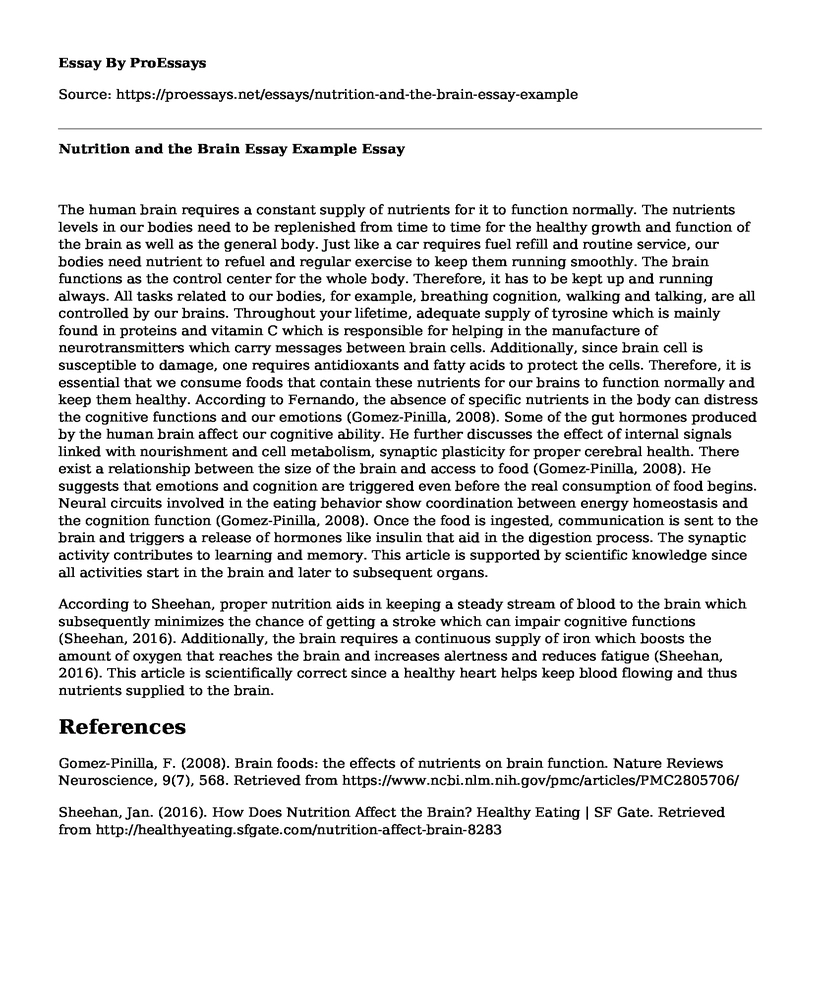The human brain requires a constant supply of nutrients for it to function normally. The nutrients levels in our bodies need to be replenished from time to time for the healthy growth and function of the brain as well as the general body. Just like a car requires fuel refill and routine service, our bodies need nutrient to refuel and regular exercise to keep them running smoothly. The brain functions as the control center for the whole body. Therefore, it has to be kept up and running always. All tasks related to our bodies, for example, breathing cognition, walking and talking, are all controlled by our brains. Throughout your lifetime, adequate supply of tyrosine which is mainly found in proteins and vitamin C which is responsible for helping in the manufacture of neurotransmitters which carry messages between brain cells. Additionally, since brain cell is susceptible to damage, one requires antidioxants and fatty acids to protect the cells. Therefore, it is essential that we consume foods that contain these nutrients for our brains to function normally and keep them healthy. According to Fernando, the absence of specific nutrients in the body can distress the cognitive functions and our emotions (Gomez-Pinilla, 2008). Some of the gut hormones produced by the human brain affect our cognitive ability. He further discusses the effect of internal signals linked with nourishment and cell metabolism, synaptic plasticity for proper cerebral health. There exist a relationship between the size of the brain and access to food (Gomez-Pinilla, 2008). He suggests that emotions and cognition are triggered even before the real consumption of food begins. Neural circuits involved in the eating behavior show coordination between energy homeostasis and the cognition function (Gomez-Pinilla, 2008). Once the food is ingested, communication is sent to the brain and triggers a release of hormones like insulin that aid in the digestion process. The synaptic activity contributes to learning and memory. This article is supported by scientific knowledge since all activities start in the brain and later to subsequent organs.
According to Sheehan, proper nutrition aids in keeping a steady stream of blood to the brain which subsequently minimizes the chance of getting a stroke which can impair cognitive functions (Sheehan, 2016). Additionally, the brain requires a continuous supply of iron which boosts the amount of oxygen that reaches the brain and increases alertness and reduces fatigue (Sheehan, 2016). This article is scientifically correct since a healthy heart helps keep blood flowing and thus nutrients supplied to the brain.
References
Gomez-Pinilla, F. (2008). Brain foods: the effects of nutrients on brain function. Nature Reviews Neuroscience, 9(7), 568. Retrieved from https://www.ncbi.nlm.nih.gov/pmc/articles/PMC2805706/
Sheehan, Jan. (2016). How Does Nutrition Affect the Brain? Healthy Eating | SF Gate. Retrieved from http://healthyeating.sfgate.com/nutrition-affect-brain-8283
Cite this page
Nutrition and the Brain Essay Example. (2022, Aug 15). Retrieved from https://proessays.net/essays/nutrition-and-the-brain-essay-example
If you are the original author of this essay and no longer wish to have it published on the ProEssays website, please click below to request its removal:
- Licensed Practicing Nursing Career Plan Example
- Analysis of Non-profit Hospital - Paper Example
- Centers for Disease Control (CDC) Paper Example
- Essay Example on Nurse Burnout: Effects on Patient Outcomes
- Centering in X-Ray Imaging - Free Report Sample
- Civil War Diseases - Essay Sample
- Essay on Empowering Patients: Applying Dorothea Orem's Self-Care Deficit Nursing Theory in Healthcare Practice







